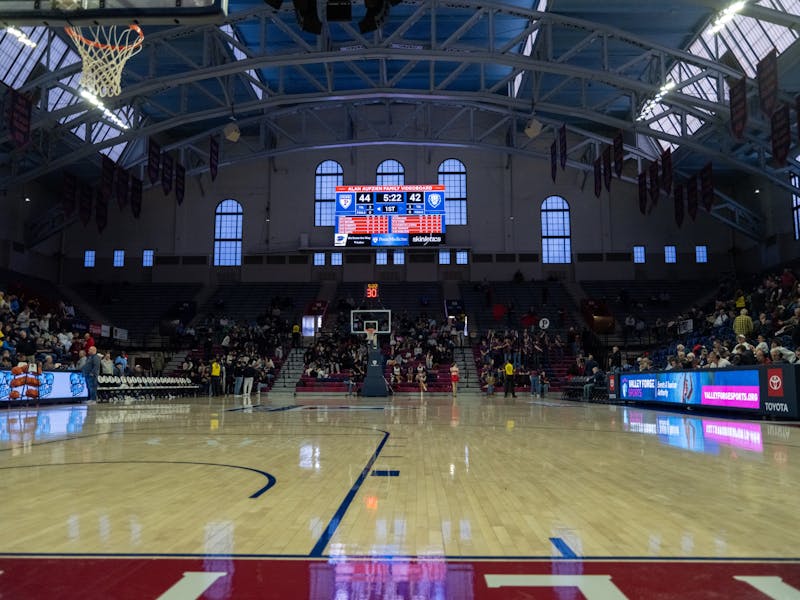
The word went out as soon as Connecticut guard Denham Brown's three-pointer clanged off the Verizon Center rim at the end of overtime.
All hail George Mason, the nation proclaimed, the first "mid-major" team to make the Final Four of the NCAA Tournament since Penn did so in 1979.
Tomorrow night, the 11-seed Patriots will face third-seeded Florida in the first semifinal in Indianapolis.
Yet the Patriots' and Quakers' journeys to the pinnacle of college basketball traveled down very different paths, which brings into question the idea that their achievements are of equal stature.
For one thing, Penn basketball was on the national stage throughout the 1970s. The Quakers reached the East Regional final in 1971 and 1972, the second round of the tournament in 1973 and lost in the first round in 1974 and 1975. In 1978, the first season with Bob Weinhauer as head coach, Penn reached the Sweet 16.
"Penn was not a 'mid-major' then," longtime college basketball writer John Feinstein said in an interview. "Penn was an elite program."
Tom Crowley, a former Penn player who graduated in 1978 and was a volunteer assistant on the '79 team, concurred.
"I played with nine guys that got drafted; Chuck Daly, Weinauer, [Bob] Stack -- this was big-time college basketball," he said. "George Mason hasn't come anything close to having anything like that, with all due respect."
Crowley gave an anecdote about how Syracuse coach Jim Boeheim reacted when his team lost to Penn in the 1979 East Regional semifinal.
"Boeheim was responding to a question about losing to an Ivy League team," Crowley said. "He said, 'We never considered Penn to be an Ivy League team -- we consider them to be a Big 5 team.'"
Nonetheless, Penn beat some of the best teams in the country in that year's tournament, and took down one of them -- North Carolina -- 72-71 in Raleigh, N.C., just miles from its campus in Chapel Hill.
As a 9-seed in the tournament of 48 teams, Penn topped the 1-seed Tar Heels, followed in the next round by the win over 4-seed Syracuse.
"We beat what was supposed to be the No. 2 team in the tournament in North Carolina, and then maybe the No. 6 team in Syracuse," Weinhauer said.
In that respect, at least, George Mason's accomplishment is similar to Penn's. The Patriots knocked off Michigan State, the Tar Heels and Connecticut in order to reach this year's Final Four. The latter team was considered by many to be the top team in the entire tournament.
The Quakers might have had a slightly easier task, though, because St. John's upset highly touted Duke in the first round.
"I think what George Mason has done is the greater accomplishment," Feinstein said. "Once Penn was by North Carolina, because of the other upsets they were playing teams that were comparable to them and teams they knew they could beat."
Perhaps the biggest difference between now and then is the amount of media attention George Mason has received across the country.
"It's not even close," Weinhauer said with a laugh. "Back in 1979, when we beat North Carolina, that was not a national game -- only the last two minutes went on national television."
He added that "when we went to the Final Four, the headline in a newspaper down south said Michigan State, Indiana State, Penn State and DePaul are going to the Final Four."
But if there is one thing both teams certainly have in common, it is the reaction on campus to being in the Final Four.
At George Mason, long derided as a commuter school in the shadow of Washington-area college sports powers Georgetown and Maryland, there have been reports of two-hour-long lines for merchandise at the bookstore.
A rally Wednesday afternoon at the student union on the Fairfax, Va., campus drew a crowd of thousands, similar to Penn's sendoff rally at Franklin Field in 1979.
Weinhauer noted "how the campus at George Mason was alive, and the people were walking with their heads up and with a little bit more bounce.
"That's exactly what happened at Penn -- the campus was alive; it was exciting," he said. "Everybody who was going to the University of Pennsylvania felt very very much better about themselves because of the fortunes of our basketball program."
Feinstein said that the memories would last at George Mason "for as long as these guys are alive."
"They'll have a 50th reunion for this team and they'll go through the tape of the UConn game again and again and again," he said.
"Unless they win some more games," he added.
If that happened, there would really be no comparison -- Penn lost to Michigan State in the Final Four by 34 points and lost the consolation game to DePaul.
The memories, though, have certainly lasted.
The Daily Pennsylvanian is an independent, student-run newspaper. Please consider making a donation to support the coverage that shapes the University. Your generosity ensures a future of strong journalism at Penn.
DonatePlease note All comments are eligible for publication in The Daily Pennsylvanian.








